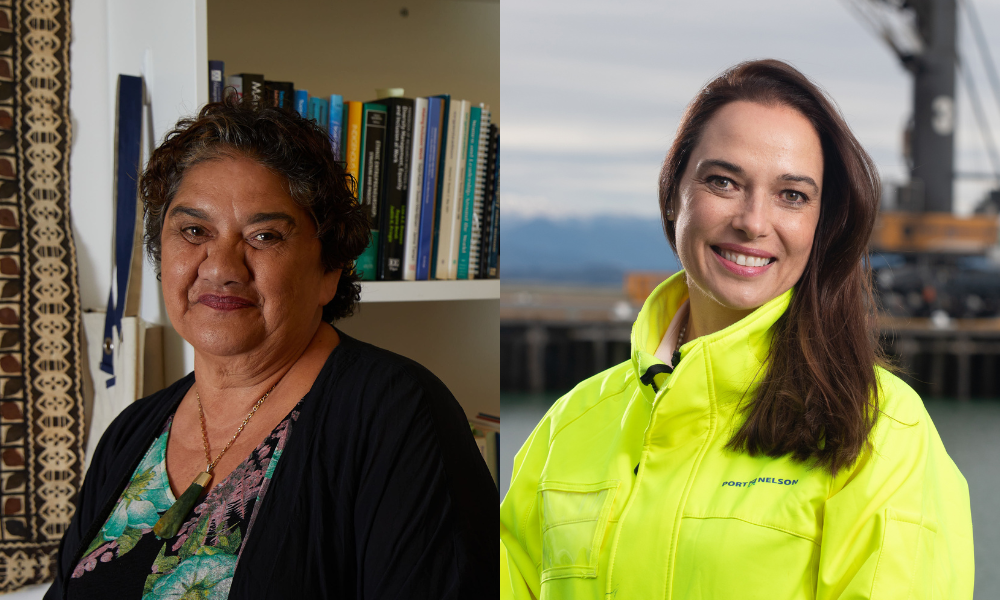
HR leader at Port Nelson cites need to be ‘authentic and meaningful’ in strengthening connections

When the Nelson Tasman Chamber of Commerce organised a Māori protocols in business course recently, so great was the demand, the organiser had to switch to a bigger venue and add an extra session.
Among those at the event was the senior management team from Port Nelson.
“It was a marvellous morning and also for us it was a great bonding experience as a team,” says Lenore Richter, GM people and safety. “We have a long-term plan to strengthen our connections and relationships with iwi and Māori and we want to ensure our workplace and practices support this.
“Going on this journey makes sense for an organisation like ours and we’re taking it slowly and working through it so that it’s authentic and meaningful. Building relationships and trust is the key priority for us here.”
Following on from the Chamber’s course, the same members of the port’s team then attended a Te Tiriti (treaty) and cultural competency workshop. More workshops are in the pipeline for the rest of the leadership team, remaining board members and key champions and influencers.
“The work won’t stop there either,” says Richter. “There will be more courses to come. The plan will be to make this training available and accessible to all of our workers, however we are still working on what this rollout will look like.”
This year, Te Wiki o te Reo Māori, Māori language week, runs from 11-17 September (Hepetema).
It’s been just over 36 years since the Māori Language Act came into being, making te reo Māori an official language of Aotearoa. The campaign is to encourage people from across the country to give te reo Māori a go - including those in workplaces.
Professor Ella Henry of AUT’s Business School acknowledges the change in people's attitudes towards Māori language and culture and the rise in numbers who are embracing it, learning it, and incorporating it into their lives.
“I’ve been able to watch over the last 30 years the growth in interest in learning te reo, not just from Māori people but non-Māori,” she says.
“There’s a significant chunk of New Zealand who are now more comfortable around te reo Māori who often have children or grandchildren who are going to schools where they're learning the language and the culture, or seeing the language and culture being personified in activities like the All Blacks’ haka, the Te Matatini Kapa Haka competitions, or through Māori Television.
“So there are a number of ways that exists now for the language to be a stronger part of New Zealander’s lives than it was 30 years ago.”
The desire to incorporate more te reo and tikanga (protocols) makes good business sense too, says Henry – who also has a background in Māori development and advancement.
Organisations that embrace it are “actually developing advantages in the marketplace” she says.
She cites the case of Whittaker’s, which in the last few years has made special te reo limited edition chocolate bars to mark Te Wiki o te Reo Māori. “Last year, it flew off the shelves,” says Henry.
The fact that the Māori word mānuka has come to be used by Australians for honey, she says, is recognition that the language has cachet overseas too.
“There are many companies in the country that utilise Māori imagery, iconography and language as a brand differentiation in the international marketplace.
“Air New Zealand is a classic example. They not only utilise the koru, the silver fern frond as their brand, but when you hop onto a plane - domestic or international - you will be greeted in the Māori language. Now, that's been a very conscious choice of Air New Zealand.
“You also have marketing agencies who understand the value or the interest that there is in the unique and distinctive approach to utilising Māori language.”
Henry goes as far as saying that organisations that avoid knowing more about Māori language and culture may miss out on opportunities.
“That’s not just because it's a Māori language and culture issue, but because those organisations that embrace diversity and difference are actually more likely to resonate with international markets - with international communities for whom that kind of thing is just par for the course.”
The theme of this year’s Te Wiki o te Reo Māori is Kia Kaha Te Reo Māori (making the language stronger). The goal is for Aotearoa to reach one million speakers of te reo Māori in 2040.
“I feel that every step in the direction of a more multicultural, multi-linguistic nation is a positive move,” says Henry. “There’s no endpoint, it's not a race. I've lived long enough to know that change that embraces diversity and difference, and embraces Māori language and culture, is positive — regardless of how quickly or slowly it happens.
“The whole point is that it is aspirational, rather than prescriptive - that we want people to embrace this as a way of growing their capabilities.”